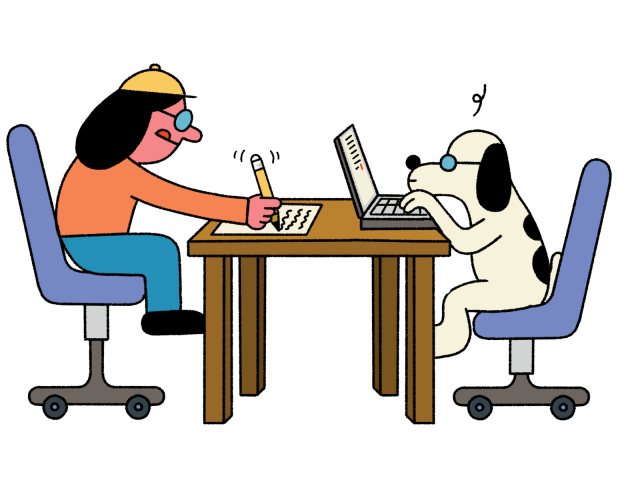NewsWise values
This lesson focuses on all of the NewsWise values.
Learning objective
To edit an audio news broadcast.
Before a script can be recorded and broadcast, a journalist must check that it is clear, makes sense and contains all the necessary information to report the story.

This lesson focuses on all of the NewsWise values.
To edit an audio news broadcast.
Proofread an audio broadcast script to ensure that it meets expected conventions.
Proofread an audio broadcast script to check the accuracy of grammar, spelling and punctuation.
Rewrite all or part of a script to address errors and inconsistencies.
Ensure that all pupils have completed their broadcast script from the previous lesson. This will mean they can spend their time focused on editing rather than finishing.
Give yourself enough time to look through your pupils’ scripts and check for the most common mistakes that are made. There are example errors in the lesson slides, but these may not cover the kinds of mistakes that are most common in your class. Your input and modelling will need to be planned carefully to meet the needs of your class and ensure the best possible outcomes.
[10 minutes]
Describe to pupils the working relationship between a producer and presenter in creating a radio show or podcast (ie that the presenter reads a script aloud and tries to sound conversational while a producer will offer tips for improvement) OR play the Role explainers by some professional producers and presenters.
Pupils pair up and take turns in being the presenter or the producer. The presenter will read the script while the producer listens. Producers may give some advice, but the focus of this activity is for pupils to remind themselves what they wrote and start thinking about how it sounds out loud.
[20 minutes]
Use lesson slides to work through the ‘What has gone wrong?’ activity where particular features have been forgotten or a mistake has been made. Discuss each mistake with the whole class before modelling how to improve and rewrite it. (Corrections are included on lesson slides for teacher reference, but modelling the corrections will always result in the best possible outcomes.)
Allow pupils time to edit their scripts, keeping in mind the features of a broadcast script that must be included. (It is good practice to model the editing process before allowing pupils to do their own. You may want to prepare a piece of writing that includes some of the most common mistakes you have noticed so that these can be addressed.)
An alternative approach is for pupils to read their work to each other — just like real presenters and producers would do. They can orally recommend changes to each other before they begin the editing process.
[25 minutes]
Use lesson slides to work through the ‘Fix the mistakes’ activity where mistakes have been made related to spelling, punctuation and grammar. Discuss each mistake with the whole class before revealing what the mistake was and how it should be corrected.
Allow pupils time to edit their scripts, keeping in mind the basics of spelling, punctuation and grammar that must be included. (It is good practice to model the editing process before allowing pupils to do their own. You may want to prepare a piece of writing that includes some of the most common mistakes you have noticed so that these can be addressed.)
As with Activity 1, an alternative approach is for pupils to read each other’s reports first. In pencil, they can circle or underline errors for their partner to correct.
[5 minutes]
Pupils work in pairs to describe the improvements they made to their script. They should aim to finish the sentences:
Something I wanted to improve was...
I improved my script by…
Once pupils have had the opportunity to discuss in pairs, invite some to share with the class. (If there is time, you can invite them to read the original script followed by their improved version to demonstrate the effects of their editing.)
What did you do well in your first draft?
What do you want to improve from your first draft?
What can you do to improve…?
How will you know that your broadcast script is more effective?
It is common for producers and presenters to work closely together throughout the process of writing, recording and broadcasting news. A presenter will read the script and make changes so that it is easier to read. A producer may also offer advice as to how it could be read more effectively, ie so that the audience stays interested and can understand all the details.
First drafts of scripts (produced in lesson 12)
English
Reading: Identify features of texts
Writing: Proofreading and editing writing
Oracy: Take part in discussions
If you are finishing the NewsWise project here, it's time to put your pupils' skills to the test! Our short, online quiz checks their fake news detective skills and asks some more questions about what they've learned along the way.
Click the button below or share this link with your class: bit.ly/pupilpostnw2425
Not finished yet? Keep going to the next lesson! You'll find the quiz in the plenary of lesson 15.
Complete the teacher survey too and you'll get a link to the quiz answers, so you can share these with your class. (We recommend completing the teacher survey shortly before, while, or soon after pupils complete their quiz, so you can share the answers with them in the same lesson.)
We'd love to see your pupils' finished news reports! Email them to us at newswise@theguardianfoundation.org - we might be able to publish them on our website!